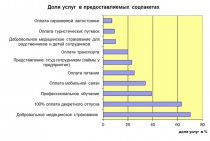Role Of Intangible Motivation Of Staff
 At present, when the market for skilled professionals is narrow enough, companies have to compete with each other under the conditions offered to candidates. The organization ' s management should therefore balance material and non-material motivation, maximizing the staff ' s interest in the results and avoiding overexpenditure of the budget.
At present, when the market for skilled professionals is narrow enough, companies have to compete with each other under the conditions offered to candidates. The organization ' s management should therefore balance material and non-material motivation, maximizing the staff ' s interest in the results and avoiding overexpenditure of the budget.
It would not be doubtful whether, in today ' s circumstances, the wording of the question was the right to life. In doing so, almost everyone can recall examples that suggest that not the money had an impact on the decision to hire and that it is even more important that the majority of employed persons are not satisfied by the amount of monetary rewards, but by additional incentives, including morals.
With other equal additional incentives, money is certainly the determining factor. The question is where to distinguish between monetary and non-monetary forms of motivation, how to identify the necessary intangible forms of motivation that enables company personnel policies to be implemented effectively. Let us try to address some aspects of the problem.
MONITORING AND CLASSIFICATION
The company ' s motivation today uses both material and non-material compensation. Both imply a set of measures to encourage staff to fulfil their responsibilities better.
All monetary payments related to the nature of the work performed, the functions of the worker and the results of its work are considered to be material reasons. Wages, bonuses, supplements and allowances may be forms of remuneration.
K intangible motivation remuneration such as social and moral may be included. Intangible benefits from work, such as recognition and status, job security, interesting work and learning opportunities, have a significant impact on staff behaviour. Many are also morally satisfied with the success of overcoming new difficulties, joining the team of great colleagues, etc. The non-financial dimensions of remuneration are almost infinitely diverse, they satisfy both emotional and intellectual demands, enable people to feel well, enable them to fully develop their talents and promote mutual understanding and support.[1]
Related posts:
 The main purpose of the staff assessment is to keep the manager informed of the professional performance of the staff of the organization and its changes. What are…
The main purpose of the staff assessment is to keep the manager informed of the professional performance of the staff of the organization and its changes. What are… Motivating staff through KPI is a tool for building efficient business and functioning that any company is interested in. Reliable and quantifiable KPI indicators…
Motivating staff through KPI is a tool for building efficient business and functioning that any company is interested in. Reliable and quantifiable KPI indicators… Specialist on benefits, development and compensation is responsible for the efficiency and effectiveness of staff development and training, material and intangible…
Specialist on benefits, development and compensation is responsible for the efficiency and effectiveness of staff development and training, material and intangible… On 27 May, Moscow hosted the All-Russian Forum-ConcurringUntemporary Staff Motivation - 2016, organized by Ludy and Communications in partnership with ROSBANK…
On 27 May, Moscow hosted the All-Russian Forum-ConcurringUntemporary Staff Motivation - 2016, organized by Ludy and Communications in partnership with ROSBANK… The content of the article is essential for the Staff Adaptation Programme to ensure that all companies and enterprises have a unified staff reception procedure…
The content of the article is essential for the Staff Adaptation Programme to ensure that all companies and enterprises have a unified staff reception procedure… The next key factor in establishing the foundation of the motivational system is the understanding of the management of its basic principles, the key feature of…
The next key factor in establishing the foundation of the motivational system is the understanding of the management of its basic principles, the key feature of… An audit of your restaurant is necessary to determine which sources will generate the greatest income for your restaurant business. Audit will identify the necessary…
An audit of your restaurant is necessary to determine which sources will generate the greatest income for your restaurant business. Audit will identify the necessary… What do you know at Workshop 1. How better to motivate their subordinates. 2. What modern methods of stimulus are you able to put into practice. 3. How to develop…
What do you know at Workshop 1. How better to motivate their subordinates. 2. What modern methods of stimulus are you able to put into practice. 3. How to develop… The growing demand for enterprise business process systematization is primarily due to the main objective of building business processes, the desire to improve business…
The growing demand for enterprise business process systematization is primarily due to the main objective of building business processes, the desire to improve business… Marking approach to personnel management in Russian companies, Contents I. The development of innovative approaches to staff management. The development of innovative…
Marking approach to personnel management in Russian companies, Contents I. The development of innovative approaches to staff management. The development of innovative…